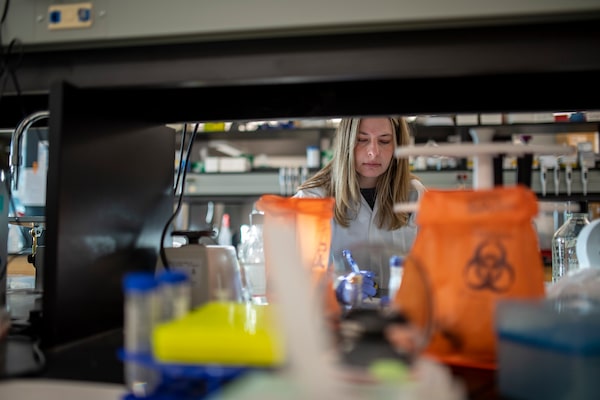
Alyson Kelvin works at inside a VIDO-InterVac lab in Saskatoon on March 13, 2020.Liam Richards/The Canadian Press
Ottawa will fund existing research projects across Canada to improve the odds of finding vaccines and treatments against COVID-19, as well as invest in future vaccine-production capabilities.
At a news conference on Monday, Prime Minister Justin Trudeau said vaccines “will take months to develop and test,” but he said the government wants to give a boost to companies and organizations that are already actively looking for solutions to the health crisis.
“On vaccines, we are helping companies that are nearing clinical trials to accelerate their work, to have results more quickly,” he said.
Mr. Trudeau’s announcement did not include a breakdown of the funding that will go to each project. The money will be coming from the $275-million in funding for coronavirus research announced earlier this month.
The recipients of federal funding will include Vancouver-based biotech company AbCellera Biologics Inc., which is developing antibody-based drugs to treat and prevent COVID-19, and Quebec City-based Medicago, which is in the pre-clinical-testing phase for a plant-based vaccine. Medicago recently received $7-million from the Quebec government to continue its work.
Ottawa is also providing a total of $23-million to the University of Saskatchewan’s Vaccine and Infectious Disease Organization – International Vaccine Centre (VIDO-InterVac) to continue its research and to expand its bio-manufacturing capacity.
The funding will allow the VIDO-InterVac, which is on the leading-edge of the hunt for a COVID-19 vaccine, to expand its lab beyond vaccine research to produce large quantities for the public in times of pandemics.
However, it’s unclear whether that expansion will come in time for a COVID-19 vaccine. Researchers expect it is at least a year away from being proven effective in humans and even then, the expansion may not be ready.
Dr. Volker Gerdts, director of the VIDO-InterVac facility, said it will be a race to build the facility by next summer, so that it can assist in producing COVID-19 vaccines.
“If we can really fast track the regulatory approval for this, we might be able to start producing our own [COVID-19] vaccine here in this facility. We don’t know that for sure. It’s all unknown at the moment,” Dr. Gerdts said.
Most likely, this expansion will set up Canada for the next pandemic, in the way that vaccine researchers now wish they were prepared for COVID-19.
“The next emerging disease is just around the corner, and so we need to have in Canada these facilities to be prepared for it,” Dr. Gerdts said. “Hopefully the next time we’ll be better prepared than what we are at the moment.”
The government is also providing $15-million to the National Research Council of Canada’s facility in Montreal to be better prepared for the eventual production of a vaccine.
Canada has lost most of its ability to independently produce vaccines over the past 20 years, as facilities closed or relocated. Until now, Canada has been buying most of its vaccines from other countries or global vaccine makers, but in times of shortages that can leave the country at the back of the queue.
Mr. Trudeau also announced a contract with BlueDot Inc., a Toronto-based company that is monitoring the spread of COVID-19, “to inform government decision-making as the situation evolves.”
Lindsay Bryson, the chief operating officer of BlueDot, said the company will be “tracking the outbreak and anticipating its spread.”
She said the goal will be to help the government “understand how the virus is spreading and evolving and what mechanisms or interventions are effective to better inform decision making.”
BlueDot has already been working with Ottawa, receiving $344,000 in contracts in the 2018-2019 fiscal year. The value of its new contract with the federal government was not available on Monday.
Meanwhile, Innovation Minister Navdeep Bains has asked postsecondary institutions whether they can share protective medical equipment or help manufacture equipment.
“The impact of the global COVID-19 pandemic on Canada will be all the worse if we face the equipment shortages that some other countries are experiencing,” Mr. Bains said.
With a report from Sean Silcoff
Sign up for the Coronavirus Update newsletter to read the day’s essential coronavirus news, features and explainers written by Globe reporters.
 Grant Robertson
Grant Robertson